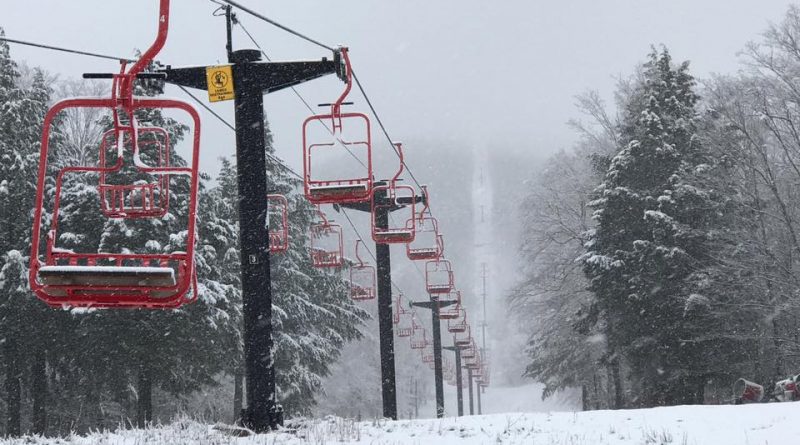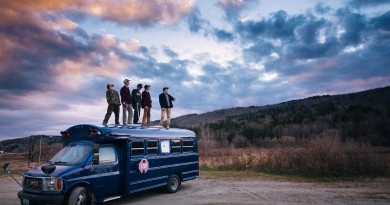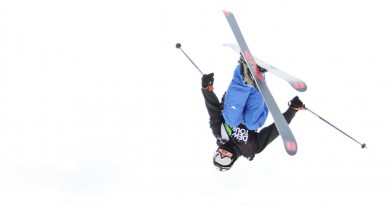Vermont Ski Areas Face $100 Million Loss
Day passes have long been an intentionally scarce commodity at Magic Mountain Ski Area.
The resort, situated on Glebe Mountain in Londonderry, offers a laid-back traditional ski experience — something quite different from some of the mega-resorts. In a typical year, Magic Mountain limits its day pass sales to 1,500.
But this winter, Magic cut its day pass limit to 650 in an effort to decrease crowding, allow social distancing and meet state-set capacity regulations.
Paid visits to Magic Mountain decreased by 25%, and food and beverage sales, which typically account for a third of the resort’s revenue, dropped by 40%.
The numbers were just as dismal at other Vermont ski areas. Between higher costs and lower revenue — both caused by the Covid-19 pandemic — dealt an estimated $100 million blow to the state’s $1.6 billion ski industry this winter, according to the Vermont Ski Areas Association.
“We’re a community mountain; people like to hang out and tell stories. But there were no bands, no entertainment,” said Geoff Hatheway, president of Magic Mountain. “We did what we could, spreading things out outside of the mountain, but it definitely hurt us.”
The Vermont Ski Areas Association estimates that lodging and food and beverage sales were hit the hardest, with 60% and 70% decreases, respectively. Paid skier visits declined by 40%.
Overall ski visits decreased by only about 20%, but Molly Mahar, president of the group, said that statistic comes with a caveat.
Season pass holders still frequented their favorite resorts at high rates, she said, but the number of day pass visits plummeted. State regulations made it less practical for people to travel from out of state, and the shutdown of the U.S. border with Canada cut deeply into a reliable customer base.
Jay Peak and Stowe Mountain Resort typically draw lots of skiers and visitors from Canada, but not this winter.
“The federal border closure and the state’s travel restrictions were a big reason for the large declines in day ticket sales and lodging revenues,” Mahar said in a statement Tuesday, “while indoor capacity and gathering limits hurt food and beverage and ski school.”
Given that two large corporations, Alterra and Vail, bought the state’s largest ski areas in recent years helped local resorts weather the financial storms. Alterra and Vail have much deeper pockets than individual ski areas in Vermont.
Vermont still has one of the strictest domestic travel policies in the country. For most of the ski season, out-of-state visitors were required to quarantine for 14 days, or seven days with a negative Covid-19 test. People who are fully vaccinated were recently made exempt from that policy. (Starting Friday, out-of-state travelers will no longer have to quarantine.)
Out-of-state skiers typically account for about 75% of the 4 million ski visits to Vermont resorts in a given year, Mahar said.
Enforcement of the quarantine rules relied on the honor system, but resorts still had to limit crowds, keep indoor settings far below normal capacity and remind guests to wear their masks.
Hatheway said Magic Mountain started preparing when the pandemic first struck last March. The resort built outdoor dining setups, and installed Plexiglas and air-purification systems indoors to limit the potential viral spread. And when it came to enforcing the mask requirement, Hatheway said, a smile went a long way.
“People appreciated the fact that we were enforcing things and doing it nicely,” Hatheway said.
Even with precautions, however, spikes in coronavirus cases this winter were associated with areas that happened to also be ski towns, such as Burke and Dover. More recently, on-the-spot testing was made available to all skiers who wanted it by the Department of Health.
Still, no ski resort was forced to close because of a Covid-19 outbreak, and health department officials contended that ski resorts were not to blame for rising case numbers in ski towns.
The coronavirus precautions resorts took cost them considerable amounts of money, at a time when revenue streams were being severed.
So, they’re looking to next season. For instance, Magic Mountain offered credit toward next year’s pass for those who purchased a season pass and were not able to ski for Covid-related reasons or precautions.
Hatheway said he’s received emails from some customers telling the resort to keep their credits. While that’s a welcome gesture of goodwill, those credits are just a drop in the ski resort bucket.
As it did with other businesses across Vermont, the state set up funding avenues to help resorts recoup lost revenue and to enhance resort safety. The approximately 20 alpine ski areas in Vermont received at least $5.3 million from programs set up by the state: the Economic Recovery Grant program and the Vermont Ski Area Recreation Safety Grant.
Magic received about $150,000 from those programs, and those grants and federal PPP loans were a big help, but the decrease in revenue still hurts, Hatheway said. Still, Magic was able to retain all of its year-round staff and even hired a few seasonal workers.
Now, after scraping by, he’s just looking forward to next ski season.
“The Northeast is following through very well in terms of vaccinations and progress on that front, so I think next year could be a really incredible year, regardless of what happens with the weather,” Hatheway said.



